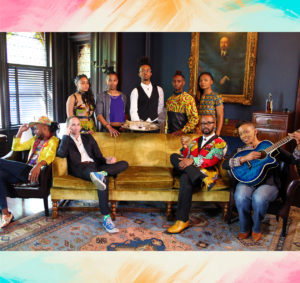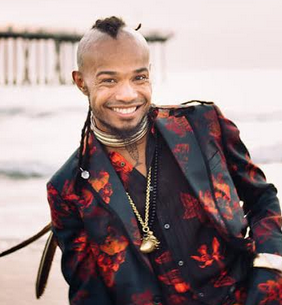Art, Imagination and Humanism: An Interview with Jé Exodus Hooper
 The cast of Humanitas. Filmmaker Je Exodus Hooper is seated on the far left.
The cast of Humanitas. Filmmaker Je Exodus Hooper is seated on the far left. In February 2019, Jé Exodus Hooper premiered his debut film Humanitas at the New York Society for Ethical Culture. The forty-five-minute film has been screened at conferences, festivals, and humanist communities across the country, igniting conversations about race, love, humanism, and the imagination. The American Humanist Association’s Center for Education encourages you to watch the film (available on YouTube for free) and join our Critical Minds program tonight, Thursday, June 25, to discuss it with the filmmaker. [Please note: the film will not be shown at tonight’s online event.]
Hooper holds the title of leader within the American Ethical Union (AEU), is a PhD candidate in interdisciplinary arts at Ohio University, and is the founder of FrequencyHouse Productions. He serves as the first Black humanist minister at the First Unitarian Society of Minneapolis, where he is working with Rev. Dr. David Breeden (an instructor with our Humanist Studies Program). Hooper’s work focuses on decolonizing humanism, seeking interconnectedness, and empowering communities. Humanitas, sponsored by the AEU’s Mossler Fellowship, re-imagines the relationship between Felix Adler—philosopher and founder of the Ethical Culture movement—and W.E.B. DuBois—civil rights activist and Pan-Africanist author. I recently chatted with Hooper about his film and other projects.
Emily Newman: Congrats on officially becoming an Ethical Culture leader! I’m excited to hear your platform talk on Sunday, August 2, ironically titled: “I’ve Come This Far by Faith.” What are your plans for your new role?

Jé Exodus Hooper
Jé Exodus Hooper: Thank you! I think it’s absolutely a wonderful opportunity to be one of the few African-American Ethical Culture leaders, especially during this time with COVID-19 and what I consider to be the reiteration of the Ethical Culture movement as an anti-racist movement. We’re seeing people of all different nationalities, ethnicities, and religious backgrounds taking the forefront in communicating the importance of Black Lives Matter in the United States—and taking the globe by storm—and ensuring that the US is operating in its truest form with conviction and accountability.
Newman: How did you research the relationship between Adler and DuBois?
Hooper: I began my journey after hearing an Adler quote about DuBois where he explained that he would never know the pain of his and other Black leaders’ efforts:
I looked that night deep into a suffering, sensitive human soul, and I tried to put myself in his place. I realized the hardships of his lot, the anguish that I myself should suffer if I were in his position. (An Ethical Philosophy of Life, p. 236)
I worked with Ethical Culture Leaders Dr. Joe Chuman—an Adler scholar—and Jone Johnson Lewis—who provided a feminist historian lens—to provide contextual analysis of Adler’s intellectual framework and relationships, and to consider what he would be like today. I consulted with Dr. Elyse Ambrose—a scholar from Drew University who works in Queer Black Ethics—and we had a briefing with Dr. Cornel West—a scholar of DuBois.
Newman: Humanitas is a collage of ideas and emotions, expressed with music, dance, poetry, readings, and silence. What do you hope people will take away from it?
Hooper: When people experience this film, they need to be prepared to open themselves up to constantly ask questions about themselves and society. The film is a ritual. The film should cause us—like any ritual—to respond and not just reflect.
Newman: In the summer of 2016 I saw you perform “The Black Sacred Communion” at the Brooklyn Society for Ethical Culture about police violence against Black people. You rested unclothed on a table in the middle of the room to symbolize a dead body. Along with poetry and music, people read the names of all the unarmed Black people killed by police that year and the audience said “asante” (Swahili for “thanks”) after each name to appreciate the person’s life. Afterward, the audience discussed the unnerving realization of how much longer the list was than they expected and how important it is to recognize all the lives lost.
Hooper: It’s a very tough piece to do because it requires that we sit with the tension of understanding the Black body as an enemy of the state or a criminal. DuBois asks how it feels to be born a problem, [to be taught] that blackness is a problem or a defect to the American ideal. With this season of protests, I’m absolutely floored and embrace the power of not only Black lives mattering but Black trans lives, and Black women’s lives, and Black children’s lives, and Black seasoned elders’ lives, and those aligning themselves with the oppressed and committing themselves to working for justice. We call out the names not only as an act of remembering but as an act of resistance so that we bring conviction and correction to a system that would have us forget the names. There is power in those names because they call us to deal with reconciliation and seeking out truth in healing.
Newman: After tonight’s discussion you’ll be teaching our next Further Reflection event on aesthetic philosophy and diving into the power of imagination, embodiment, and intuition. You’re also doing a session with Rev. Dr. David Breeden on “Decolonizing Humanism” at the AHA’s virtual conference on Saturday, August 8. What can we look forward to with that event?
Hooper: David and I are planning to unpack the context of American humanism with particular focus on American colonialism, which is very important because in many ways America is colonized and to be post-colonial and de-colonial requires us to de-oppress the structures that have been made and set up by Anglo-Saxon culture. We’ll unpack de-colonial efforts within anti-racism and re-indigenization, in science and evolution, and begin to see that humanism has to look at its relationship between aesthetics and ethics.
Newman: What else are you working on and how can people learn more?
Hooper: I’m working with Ohio University’s theater school to establish a task force for identity, inclusion, and equity to ensure that we have an environment that allows for people to courageously show up and access areas of discomfort, and to practice deep listening to push against discriminatory practices. My Facebook Live and IGTV production, Keep Liv’n, continues almost every Tuesday at 8pm ET. It embraces self-care as part of culture-care, because I can’t stress enough how important it is for us to be curators of culture. For more visit https://www.jehooper.com.
